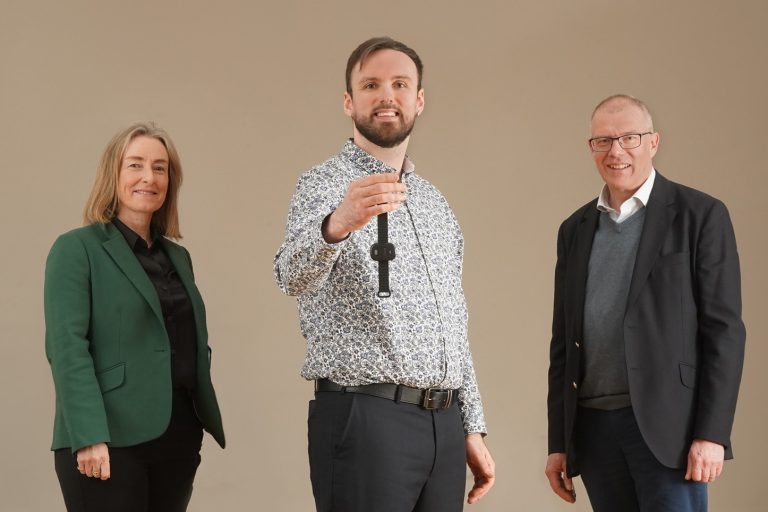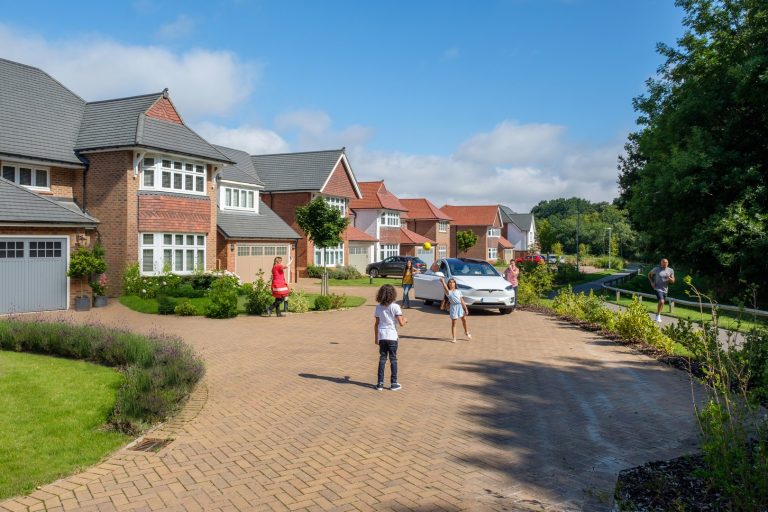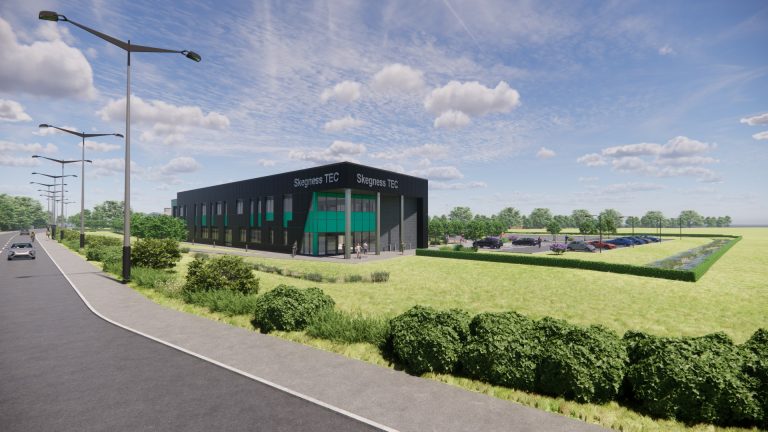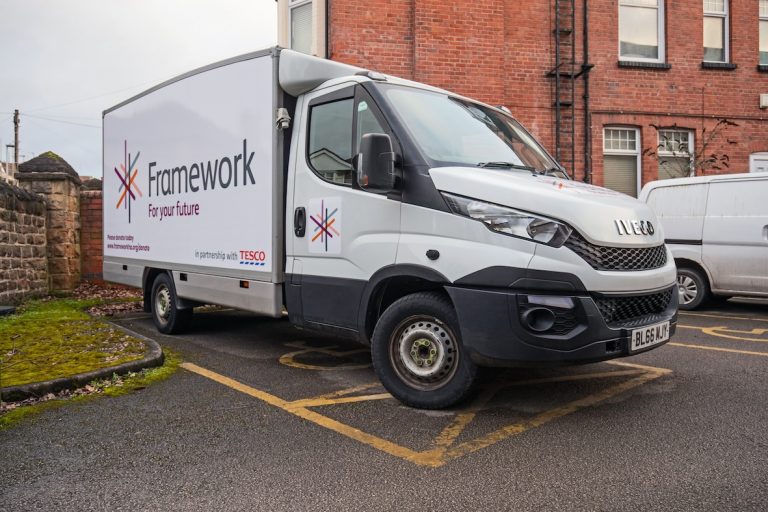Neupulse secures funding to advance world’s first wearable device to tackle Tourettes Syndrome
Local housebuilder set to bring 93 new homes to Nottingham
A local housebuilder is set to bring 93 homes to Fairham, in Nottingham.
Work is set to begin for Redrow East Midlands, who will be joining the Fairham scheme with planning now officially granted by Rushcliffe Borough Council.
Dovecote Grange will include a mix of private and affordable homes for those in the community, including a mix of three, four and five bedrooms on offer from the housebuilder’s Heritage Collection.
The properties will also be part of Redrow’s new Eco Electric generation, featuring air source heat pumps and underfloor heating as standard – designed to significantly reduce energy bills.
Dovecote Grange will form part of the wider 606-acre Fairham site, which will see a new neighbourhood created in the region, bringing new homes, employment opportunities, as well as a new sense community to this area of Nottingham. There will be shared foot and cycling paths, £100m invested in new infrastructure and 200 acres of open space as part of the scheme.
Ryan O’Sullivan, Sales Director at Redrow East Midlands, said: “We’re delighted to have been granted planning permission for this exciting new development. Dovecote Grange will provide much-needed new homes in the area and we’re thrilled to become part of the wider Fairham development.
“Here at Redrow East Midlands, we’re passionate about prioritising sustainability, which is why each home we build will be part of our Eco Electric generation, future proofed with air source heat pumps, underfloor heating and improved insulation.
“We anticipate homes will be incredibly popular, with lots of people looking to Fairham as a vibrant new community with positive prospects for the local area. Now that work is set to begin on site, we’d encourage those looking to purchase a home to register their interest as soon as possible.”
Construction underway on new further and higher education campus in Skegness
The best ways to support and develop your employees this year
- Encourage learning at all levels: Lead by example. Management should actively engage in learning opportunities, demonstrating the value placed on continuous personal and professional development.
- Personalise learning pathways: Recognise that employees have varied learning styles and career aspirations. Work with them to create personalised learning plans that align with their goals and the needs of the business.
- Leverage technology: Utilise online platforms and e-learning tools to provide flexible, accessible learning opportunities. Many platforms offer courses ranging from technical skills to leadership development.
- Assess needs regularly: Conduct regular skills audits and consult with employees to identify training needs within your team. This ensures that training initiatives are targeted and relevant.
- Diverse training methods: Incorporate a mix of training methods to cater to different learning preferences. This might include in-person workshops, online courses, webinars, and peer-to-peer learning. For example, if you’re looking for training for the leaders in your company, look for leadership skills training that suits different stages. Impact Factory can tailor their skills courses to suit your needs.
- Measure impact: Evaluate the effectiveness of training programmes by measuring improvements in performance and feedback from participants. This can help refine future training initiatives and demonstrate ROI to stakeholders.
- Regular check-ins: Don’t wait for annual reviews to provide feedback. Regular one-to-ones offer timely insights into performance and development needs, fostering a more responsive and dynamic growth environment.
- Focus on development: Frame feedback in terms of development opportunities. Discuss actionable steps for improvement and offer support in achieving these goals.
- Create a two-way dialogue: Encourage employees to share their perspectives and aspirations. This not only helps tailor development efforts but also reinforces their role as active participants in their growth journey.
- Formalise mentorship programs: Establish structured mentorship programs that pair less experienced employees with seasoned professionals. Provide guidelines and training for mentors to ensure they are prepared to offer valuable support.
- Offer professional coaching: Consider investing in professional coaching for high-potential employees. Coaches can work with individuals on specific development areas, leadership skills, or career progression plans.
- Promote peer learning: Encourage informal mentorship and peer learning opportunities within teams. Sharing knowledge and experiences can foster a supportive learning environment and enhance team collaboration.
- Flexible working arrangements: Offer flexible working options, such as remote work, flexible hours, and compressed workweeks. These arrangements can help employees manage their personal and professional responsibilities more effectively.
- Encourage time off: Promote a culture that values taking time off for rest and rejuvenation. Ensure that employees feel comfortable taking their full entitlement of annual leave without fear of falling behind or being perceived as less committed.
- Provide resources for well-being: Offer access to well-being resources, such as employee assistance programmes, mindfulness sessions, or fitness memberships. Supporting employees’ physical and mental health contributes to a more positive and productive work environment.
- Career pathing: Work with employees to understand their career aspirations and identify potential paths within the organisation. Transparent discussions about career progression can motivate employees to develop the skills needed for future roles.
- Skill-based assignments: Encourage participation in cross-functional projects or task forces. These opportunities allow employees to apply their skills in new contexts and learn from colleagues in different areas of the business.
- Transparent job postings: Ensure internal job openings are widely communicated. Providing clear information about the skills and experiences required for each role can help employees identify development areas and apply for positions that align with their career goals.
Bassetlaw secures £20m levelling up boost
- £14m to redevelop old print rooms in Worksop, a vacant retail unit in Priory Shopping centre and a derelict site in Harworth & Bircotes. This will help create a new education centre, NHS health and wellbeing centre, and community hub.
- £3m for streetscaping in Retford, Worksop and Tuxford town centres, helping to improve access and tackle anti-social behaviour.
- £1.5m for Worksop to renovate derelict land and create a community farm shop.
- £1m to redevelop Retford Town Hall into a new community space, including a banking hub and £150,000 for investment in Manton Children’s centre in Worksop for use as a Family Hub whose services will support local families.
- £120k of funding to the Council to support them in their local skills scoping work to ensure people can make use of the economic opportunities that STEP will bring and strategic visioning for the arrival of STEP.
- £100k of funding for studies to help improve the town centres of Bassetlaw, which will further prepare the town and surrounding areas for the arrival of STEP.
Family run motor group acquires Burton car retailer
Recycling initiative launched to transform lives of homeless people
A new programme, devised by the charity Framework, can help businesses recycle domestic or office furniture, electrical appliances, fixtures and fittings and, at the same time, transform the lives of homeless people.
Framework provides supported accommodation for around 3,000 homeless people each year across Derbyshire, Lincolnshire and Nottinghamshire. Every year Framework furnishes and equips around 600 units of accommodation – mostly one-bed flats – at an annual cost of £660,000.
The Furnishing Futures scheme aims to help two types of business. It offers a solution for producers, suppliers and retailers seeking to dispose of dead stock including furniture, electrical appliances, kitchenware, soft furnishing and bedding. The scheme is also aimed at businesses wishing to recycle and repurpose items following a refurbishment.
Furnishing Futures is designed to accept either regular or one-off donations. Every donation will receive an impact report to help the business demonstrate the resulting social and environmental impact – outlining the number of people helped and the number of items diverted from landfill. This information can be used to show progress towards achieving Environmental, Social and Governance (ESG) goals.
Nottingham’s Lace Market Hotel has recently become the first donor to the new Furnishing Futures scheme with the provision of beds, desks and chairs. Area Sales Manager Richard Adamson said: “We are proud to have supported Framework’s Furnishing Futures initiative, contributing to their mission to end homelessness and tackle disadvantage by helping to furnish properties for local people experiencing homelessness.
“This initiative is ideal for hotels like ours as we are currently going through a soft refurb. Instead of disposing of these items in a less environmentally- and socially-conscious way, we wanted to ensure our old furniture could help give a new lease of life to someone who needs it.
“We are big believers in helping make our local community a safer, cleaner and more comfortable place for everyone. By working in partnership with Framework we are delighted to have been able to do just that and we would urge other hotels and businesses to consider doing the same.”
Matt Cooke, the Framework fundraiser managing the scheme, says: “The Department for Environment, Food and Rural Affairs (DEFRA) estimates that, in 2020, the UK generated approximately 28 million tonnes of commercial waste, much of which was incinerated or sent to landfill.
“That waste will have included many thousands of items of hard and soft furnishings – often in great condition or still brand new – that could have had a new lease of life.
“What many producers, suppliers and retailers might consider ‘dead stock’ is seen by charities like Framework as something that can help build new lives.
“We want to highlight the opportunity to businesses who have a problem disposing of high-quality, ex-display, returned or end-of-line hard or soft furnishings, electrical appliances, kitchenware and bedding.
“In addition, Furnishing Futures is relevant to businesses who are contemplating refurbishment and are looking for a disposal solution that is both cost-free and demonstrates their sense of social and environmental responsibility. We are very grateful to the management at the Lace Market Hotel in Nottingham who have recently provided proof of concept by becoming our first Furnishing Futures donor.
“We invite businesses to join forces with Framework through our Furnishing Futures initiative and donate their stock to give it – and the people we support – a new lease of life.
“Our charity faces immense cost-of-living pressures – for instance our annual fuel bill rose by 81% in the past year meaning there was £1.3m less to spend on supporting people in need. By saving us the cost of purchasing new goods, businesses participating in Furnishing Futures will enable us to divert similarly much-needed resources to support the growing number of people seeking our support in these difficult times.
“Furnishing Futures offers a win for businesses; it is also a win for Framework and the people we support, and it’s definitely a win for the environment!
“So we look forward to working with interested business partners to make a difference together through this exciting and innovative project.”
To turn an empty house or flat into a welcoming home for someone who has been experiencing homelessness the items needed by Framework include:
-
Furniture: 2-seater sofas, dining tables and chairs, coffee tables, bedside tables, wardrobes, chests of drawers and single bed frames
-
Electrical appliances: kettles, toasters, microwaves, vacuum cleaners, TVs, smartphones with chargers, laptops with chargers
-
Kitchenware: cutlery, dining sets (bowls, plates, mugs), cooking utensils, cooking pans, oven trays
-
Bedding: mattresses, sheets, duvets and covers, pillows and cases
-
Furnishings such as roller blinds, lamps and lampshades.
Harris Lamb appoints principal ecologist
Property consultancy Harris Lamb has appointed a principal ecologist to its CIEEM-accredited environmental department to meet the growing demand for its services.
Susan Sweetman joins from Wakefield Council and brings more than 15 years experience in key ecological roles throughout the UK to the business, including positions at Forestry Commission Scotland, Scottish Natural Heritage and Derbyshire Wildlife Trust.
Susan, who has an Honours degree in Zoology from the University of Edinburgh and a master’s degree in Conservation and Biodiversity from the University of Leeds, has a particular passion for botany and nature-based solutions.
Dr Holly Smith, head of Harris Lamb’s Environmental department, said: “We are delighted to welcome Susan to our team, where, thanks to her enthusiasm and extensive experience within the field, she will be a huge asset.
“Susan brings a diverse range of skills to the business, including a track record of conducting ecological appraisals, protected species surveys, Environmental Impact Assessments and Biodiversity Net Gain calculations and is also experienced in providing advice on ecological legislation, policy and knowledge to clients, community groups, landowners, planners and developers.
“Her understanding and confidence in explaining the risks to the environment and penalties faced by stakeholders are essential skills that will be of huge benefit to our clients,” added Holly.
Susan has a passion for protected species, having obtained a Natural England great crested newt survey licence and gained a wealth of experience carrying out bat surveys on top of voluntary work conducted with the Derbyshire Bat Group, in addition to pursuing further experience of carrying out surveys for otter, water vole and white-clawed crayfish.
Susan said: “I was attracted to Harris Lamb due to its excellent reputation for practising ecology within the commercial sector, and I welcomed the opportunity to continue to work with a diverse range of stakeholders to advise on and oversee ecological projects and further their understanding of the importance of sustainability.
“I am passionate about protecting species and habitats and helping them to thrive and am looking forward to providing additional ecological expertise to the commercial and residential developments, and to helping to bring these to fruition while both protecting and enhancing wildlife and biodiversity throughout the country.”












